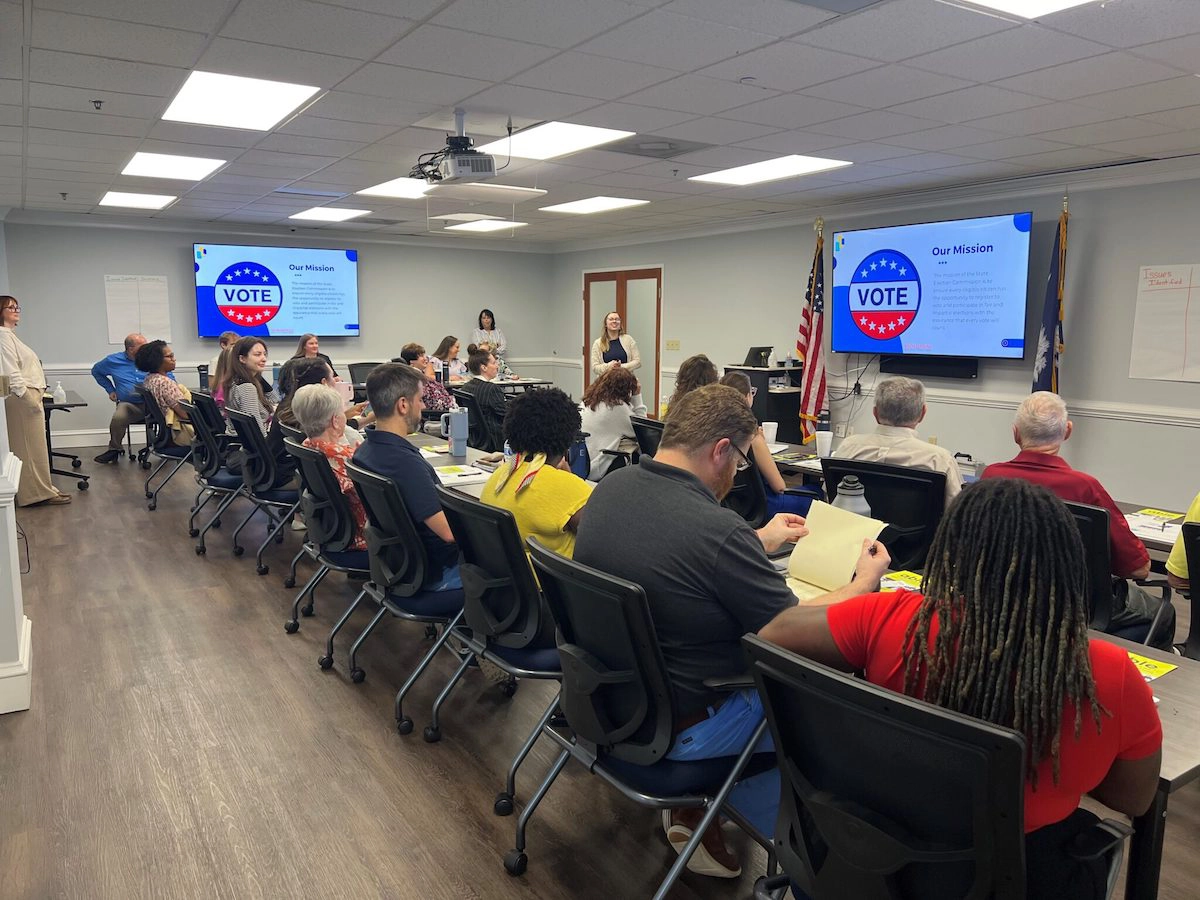Salaries for county election directors vary widely, even among counties of similar size
By Abraham Kenmore
SCDailyGazette.com
COLUMBIA — Less than two weeks into his role as interim election director of Aiken County, Michael Bond was running his first election.
The county’s longtime elections director, Cynthia Holland, retired effective May 23. There was a special election in the first week of June. Then the statewide primaries the next week.
At the end of May, Bond realized school district lines had changed, and he had to update voter rolls, too.
“I kind of thrive in challenging environments, but you know, 80-plus hours every week for extended periods of time, because we had back-to-back elections so often here, it kind of takes its toll after a while,” he said.
Bond had just two other staffers in an office serving more than 100,000 registered voters in the state’s 11th most populous county. Poll workers were hard to come by during graduation season, and some dropped out the day of the election. His few staffers were exhausted, he said.
Still, Bond made it work with some help from the state Election Commission. State employees came in to train poll workers, answered phones in the election office and even helped run the polls.
He didn’t last much longer.
After 13 years in the election office, Bond resigned, effective Aug. 9. He said he was leaving partly due to health issues but also frustration over the lack of staff.
“We’ve begged for years to increase our staff so people would have experience under their belts instead of getting thrown into the mix as a temporary employee just before elections,” he said.
Now, just two months away from early voting in South Carolina for the contest that will decide the president, Aiken County is on its third election director and second interim election director this year.
Turnover is the norm
Heading into November with a new election director is the rule, not the exception, for South Carolina counties. About 80% of directors have been hired since 2021 as counties struggle to retain experienced staff.
“A lot of election officials are having to deal with, frankly, a lot more stress, a lot more criticism and a lot more scrutiny,” said South Carolina Election Commission Director Howard Knapp. “A lot of people, obviously, have said, ‘It’s not worth it. The pay is not worth putting up with all this.’
“And that’s not me saying that. That’s county directors telling me that,” he continued, “‘This ain’t worth it anymore.’”
Stress and harassment have ramped up since the 2020 election, Knapp said. The pay has not kept pace.
Although it is only one issue feeding into the turnover, Knapp and others think more consistent pay could help keep experienced election workers for the future.
Many county election directors make less than the 2023 state average wage of just more than $54,000, with little consistency across counties.
Some directors make less than $40,000, others more than $90,000.
Pay tends to be lower in smaller counties, but not always. Bamberg County pays almost $18,000 more than Union County for about half the number of registered voters.
It is hard to find any statewide trends, as no organization has fully up-to-date information on what election directors in South Carolina are paid.
The state Election Commission provided the S.C. Daily Gazette with a list of what each county pays. But the data is out of date in some places.
Ethics disclosures required annually for public officials, which include their state-paid salaries, fill the gap in some cases. However, given the heavy turnover in many offices, directors who have been in office for just a few months don’t yet have to file the form, called a statement of economic interest, with the state Ethics Commission.
The state organization of election officials does not track director pay.
Even with limited data, though, the wide range is clear: The highest paid director in the state makes close to four times more than the lowest-paid directors.
Regardless of what they’re paid, their roles in elections are the same.
Their oversight duties include updating voter information when addresses or district lines change, recruiting poll workers, finding polling locations, communicating with the public, programming voting equipment, keeping up with state education requirements, managing the office budget and, of course, running voting not only on Election Day but also for early, absentee and overseas voters.
The resources to do all of this comes from the county, even though the county does not directly oversee the office, a situation that Knapp said can cause tensions.
The county election director is appointed by a county board of elections, which in turn is appointed by the governor based on the county’s legislative delegation recommendations.
“It is a convoluted system for which there is no straight answer, and it requires cooperation — good faith cooperation on everyone’s part,” Knapp said.
Election directors also do not receive a state stipend to the salary from the county, unlike other local government positions such as sheriffs and clerks of court.
Where there are gaps in resources, the state Commission tries to step in to fill them.
“I can’t control their pay. I can’t control their office environment, and I can’t control whether they want to leave or not. But I can help control the resources they may have at their disposal,” Knapp said of election directors.
That was what Knapp tried to do in Aiken County after Bond asked for state help.
Bond had worked as an assistant to Holland, the past election director, for 13 years.
(Holland has since been indicted for on accusations of defrauding Social Security. She has pleaded not guilty and it does not appear the charges have anything to do with her official position.)
Bond, 48, was a combat engineer in the Army, reaching the rank of specialist, before being injured and having to leave the military. Now using a wheelchair, he said he could no longer do outdoor work. He went to college, studied political science, and found work in elections.
“I wasn’t able to finish my military career, and I felt like this was a way I could serve,” he said.
Holland made $71,000. That was what Bond said he expected when he stepped into the new role. Instead, he got a $10,000 raise that bumped his salary to $64,000.
Bond said the pay increase would have been nice, but that wasn’t why he decided to leave.
“I’ve never really been in this for the money,” he said.
Replacing him as interim director is Judy Justice, a former poll worker and clerk, Blanche Wimberly, chair of the Aiken County board, told the Gazette last week.
The board is interviewing permanent replacements this week, and Wimberly said she was not sure when the county would have a new director. The job listing had a start date of Sept. 15, one month ahead of early voting for the general election.
Asked what advice he would give his replacement, Bond said, “Be ready to have a love for the job, because I think most people either like it or they don’t. … I don’t think there’s much gray area.”
The lone person left
That love-it-or-hate-it attitude was how Dana Burden felt, too.
Burden stepped in as election director for Saluda County on Jan. 22 — the first day of early voting for Democrats’ presidential primary.
Burden was literally the only person left in the office, as the last director and assistant had both recently resigned, leaving the office closed illegally for several days in early January.
Luckily Burden, 50, did have some experience. She had run the office from 2013 to 2017 before leaving due to personal reasons, including health challenges.
“My board (of elections) came in, they rotated out, they would come in and answer the phones for me,” she said. “When I was the director the first time, we didn’t have early voting. That was something new since I left.”
Burden is also a certified dental assistant, and she worked in dentistry before being asked to return to the county. The state provided a strong training program, though, and she had prior experience to help her get up to speed.
“Saluda County is a small county, so we have 13 precincts. We have approximately 12,000 registered voters,” Burden said. “It’s not like going to Richland County, but we still have to do the same work Richland County does — just in smaller quantities.”
When she left, Burden said the pay was about $30,000 or a little less. Now it is $45,000, which she said isn’t great but better than what past directors were paid.
Increasing pay could help with retention, she said, but it was not the only factor in people leaving.
“Your name could be plastered across every media outlet there is because something went terribly wrong. When something goes terribly right, they don’t mention it,” she said. “For elections, you don’t get a dress rehearsal. It’s do or die.”
That level of perfection, and the range of skills, makes election directors well qualified for a number of potentially better compensated roles in government, said Isaac Cramer, which makes it easy for them to leave.
Cramer, 35, has been the director of Charleston County elections for the last three years and worked in the office for the last decade. He is also the current president of the South Carolina Association of Registration and Election, the statewide advocacy organization for election workers.
Like other directors, Cramer stumbled into election work — in his case, after several years working on electoral campaigns. But he has a passion for it and thinks the work needs greater recognition by counties and the state.
When he became the director in Charleston, Cramer said, some of his staff had customer service job titles even though they were in very technical roles. Across election offices, pay grades and job titles have not been brought up to the 21st century, he said.\
State supplement?
Cramer is also almost certainly the highest paid election director in the state at just under $140,000, according to a list of Charleston County employee salaries from last July.
He argues that election officials are department heads, in line with a deputy county administrator, and should be compensated as such.
One way to do this, Carmer thinks, would be for the state to introduce a salary supplement like those provided to other county officials. Knapp, the state election director, also thinks a salary supplement could help retention.
Rep. Brandon Newton, R-Lancaster, introduced a bill in January to do exactly that.
The bill went nowhere but he plans to try again next year. Although Newton does not have an exact number, he thinks somewhere in the range of $10-15,000 would be about right.
“That’s a massive pay bump for the people of those offices,” he said, especially in smaller rural counties.
Still, pay is only part of the issue.
So is understaffing and the sheer number of elections that counties can be responsible for, Newton thinks. And when people do leave, a lot of institutional knowledge is lost.
“These counties that have only one employee, who is the director, in the entire office, when that person leaves you lose all knowledge in that office,” Newton said. “And so you are starting from scratch.”
Abraham Kenmore is a reporter covering elections, health care and more. He joins the S.C. Daily Gazette from The Augusta Chronicle, where he reported on Georgia legislators, military and housing issues.
S.C. Daily Gazette is part of States Newsroom, the nation’s largest state-focused nonprofit news organization.









